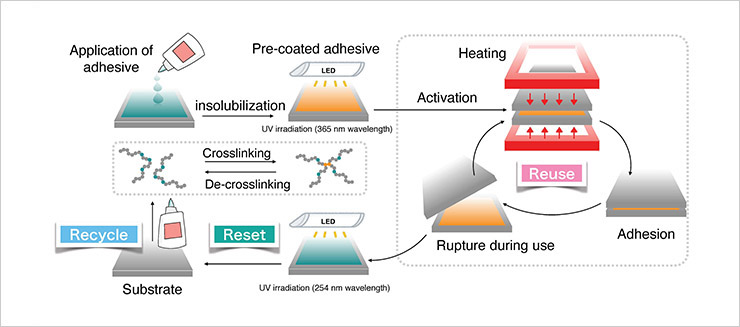Recyclable Photoreactive Adhesive
—Glue May Offer an Effective Means of Adhesion Underwater—
2023.06.14
National Institute for Materials Science (NIMS)
Japan Science and Technology Agency (JST)
The National Institute for Materials Science (NIMS) has developed a renewable adhesive that allows for repeated bonding and debonding, and can reset the substrate and adhesive to their original state when needed.
Abstract
- The National Institute for Materials Science (NIMS) has developed a renewable adhesive that allows for repeated bonding and debonding, and can reset the substrate and adhesive to their original state when needed.
- With increasing awareness of the need to balance environmental concerns with economic growth, there is a demand for technologies that enable the separation and recovery of multi-component molded products. In this context, attention is being focused on a new bonding method that provides sufficient adhesion during use and easy release once its purpose has been fulfilled. The challenge is to reconcile the conflicting elements of strong adhesion and easy removal. Furthermore, even when debonding is achieved, issues such as adhesive residue on the substrate or substrate damage have hindered material flow.
- In this study, the research team focused on caffeic acid, which can reversibly induce cross-linking and debonding reactions by irradiation with ultraviolet (UV) light of different wavelengths. A polymer containing caffeic acid was applied to a substrate and, upon exposure to 365 nm UV light, it formed a cross-linked film that became insoluble. This film shows no adhesion when stored at room temperature, but can be repeatedly bonded and unbonded when heated. Furthermore, when the film is exposed to 254 nm UV light at the end of its service life, the cross-linked portions break and return to the same state as before application, allowing both the adhesive and the substrate to be recovered and reused. In addition, the catechol groups present in the chemical structure of caffeic acid are commonly found in adhesive components secreted by attaching organisms such as mussels. This adhesive demonstrated strong adhesion and recyclability even with substrates and environmental conditions that are challenging for conventional adhesives, such as fluoropolymers and underwater adhesion.
- In future research, the team will investigate the effectiveness of this adhesive in repairing various technologies, including electronic devices, transport equipment, medical equipment and physical infrastructure with the aim of contributing to a circular economy.
- This project was carried out by a research team led by Masanobu Naito (Macromolecules Field Director, Research Center for Macromolecules and Biomaterials (RCMB), NIMS) and Siqian Wang (Postdoctoral Researcher, RCMB, NIMS). This work was conducted as the project entitled, “Revolutional material development by fusion of strong experiments with theory/data science” (grant number: JPMJCR19J3) funded by the JST Strategic Basic Research Program CREST.
- This research was published in Advanced Functional Materials on June 13, 2023, Japan Time.

Figure. Schematic illustration of an adhesive that can be reused many times, even if it breaks during use, and can be reset and reused when its task is completed.
Related files
- Research Center for Macromolecules and Biomaterials
Contact information
(Regarding this research)
-
Masanobu Naito
Field Director
Macromolecules Field
Research Center for Macromolecules and Biomaterials
National Institute for Materials Science
Tel: +81-29-860-4783
E-Mail: NAITO.Masanobu=nims.go.jp
(Please change "=" to "@")
(General information)
-
Public Relations Office
National Institute for Materials Science (NIMS)
Tel: +81-29-859-2026
Fax: +81-29-859-2017
E-Mail: pressrelease=ml.nims.go.jp
(Please change "=" to "@") -
Public Relations Division
Japan Science and Technology Agency
5-3 Yonbancho, Chiyoda-ku, Tokyo 102-8666, Japan
Tel: +81-3-5214-8404
Fax: +81-3-5214-8432
E-Mail: jstkoho=jst.go.jp
(Please change "=" to "@")
(Regarding JST programs)
-
Yusuke Ando
Green Innovation Group, Department of Innovation Research
Japan Science and Technology Agency
K's Gobancho, 7 Gobancho, Chiyoda-ku, Tokyo 102-0076, Japan
Tel: +81-3-3512-3531
Fax: +81-3-3222-2066
E-Mail: crest=jst.go.jp
(Please change "=" to "@")
Recent Press Release
-
No Need for Rare Earths or Liquid Helium! Cryogenic Cooling Material Composed Solely of Abundant Elements
2025.12.24
-
Novel Materials Design Approach Achieves a Giant Cooling Effect and Excellent Durability in Magnetic Refrigeration Materials
2025.12.19
-
Multiple Autonomous AI Systems Spontaneously Collaborate to Advance Materials Research
2025.12.10
